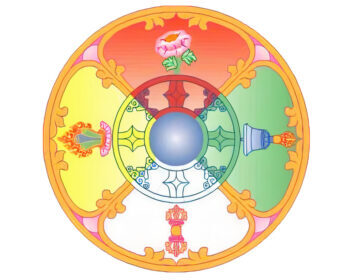Middle Way Education: The Five Domains of Learning

About This Resource
Details
Read the latest version of this document as a Google doc here.
In order to assure a balanced education, we have identified five content areas or domains of learning, drawing from the traditional five Buddha families. Inspired by the qualities of the five elements—water, earth, fire, air, space. Each of these areas also has a correlating guiding principle, which helps guide our approach to teaching and learning, knowing that we are never really confined to just one domain or element. This is simply a structure to deepen the focus for teachers and students.
Domain of Learning Element Guiding Principle Sciences Water Precision and Insight Humanities Earth Appreciation and Connection Arts Fire Authentic Communication Embodiment Disciplines Air Synchronized Activity Contemplative Practices Space Awareness
Water | Precision and Insight | Sciences
Just like water’s capacity to both reflect and be absorbed, the guiding principle of Precision and Insight cultivates an intelligence that is exact and penetrating. The domain of learning that arises from this principle is the Sciences, which include studies in logic, mathematics, systems, biological sciences, computer sciences, physical sciences, ecology, and Abhidharma. We approach the sciences with an emphasis on deep understanding, creative thinking, problem-solving, and mastery of skills and content. Curiosity is key to this process of learning; students learn to question assumptions and open up to greater levels of perception and innovation. Essential outcomes of this domain include increased discernment, cognitive and emotional flexibility, innovation, and the ability to observe, perceive, and understand one’s mind and the outer world with less rigidity. In this way, the sciences generate mirror-like precision and insight, building the capacity to focus on minute details while maintaining perspective of the big picture.
Earth | Appreciation and Connection | Humanities
Like the richness of earth, the principle of Appreciation and Connection cultivates a sense of diversity and abundance and an awareness of how all things are dependent. The domain of learning that arises from this guiding principle is the Humanities, which include the study of world history and culture, the human condition, literature, politics, world wisdom traditions, and Buddhist history and culture. To study the humanities is to delve into our heritage as human beings, to connect to the world in the context of all who have come before us and all who will follow. Students are supported in experiencing their lives as small but significant parts of a greater whole, bringing a grounded element to their education. Essential outcomes of this domain include increased humility, a deep respect for tradition, and the commitment to honor diversity without arrogance. In this way, the humanities generate a sense of appreciation and connection rooted in equanimity and the understanding that all things are dependent.
Fire | Authentic Communication | Arts
Just as fire results from elements coming into contact with each other to create a vivid, dynamic display, the principle of Authentic Communication relies on the spark of interpersonal connection to create the display of self-expression. The domain of learning that arises from this guiding principle is the Arts, which include the study of world languages, communication skills, writing, dance and theater, music, and visual and sculptural arts, and Buddhist traditional arts. Students are encouraged to exchange with the world and to explore and hone their creative energy, integrating personal meaning into their education. We approach the arts with an emphasis on understanding the dynamics of communication and authentic creative expression. Essential outcomes of this domain include increased compassion and empathy, a nuanced capacity for interpersonal exchange, an appreciation for the power of the artistic process, and the ability to express oneself without being self-absorbed. In this way, the arts generate a sensitive and discriminating awareness that ignites authentic communication.
Air | Synchronized Activity | Embodiment Disciplines
Just as air has the capacity for dynamic movement, the principle of Synchronized Activity brings inspiration, resourcefulness, and initiative into the process of learning. The domain of learning that arises from this guiding principle is the Embodiment Disciplines, which include studies in athletics, health and nutrition, sensory integration, primitive skills, undertakings that activate mind-body awareness. Students are supported in aligning action with intention. Embodiment disciplines synchronize mind and body. We approach this domain of learning with an emphasis on cultivating a relationship to form and freedom, synchronizing physical education with the student’s developmental potential. Essential outcomes include increased grace and ease, balanced levels of effort and effortlessness, a keen sense of timing, personal responsibility, and a strong sensory relationship to the natural world. The neurotic aspects of this domain, speed and ambition, are tamed by discipline of the body. In this way, the embodiment disciplines lead to accomplishment through synchronized activity.
Space | Awareness | Contemplative Practices
Just as space has a quality of total accommodation, the principle of Awareness guides some of the deepest learning we do as human beings, learning that requires the ability to remain open. The domain of learning that arises from this principle is the Contemplative Practices, which include the study of meditation, ritual, design and art, as well as the deep social-emotional learning component of our education. Spaciousness permeates the process of learning, as students cultivate awareness and deepen their connection to the present moment. Some contemplative practices require proper training from an authentic practitioner and a link to a lineage tradition. Essential outcomes include increased tolerance of ambiguity, impulse control, a habit of being in awe, and a sense of humor. The tendency to be absorbed by ignorance is lessened. In this way, contemplative practice generates the capacity to experience learning and life with an expanded sense of awareness.
